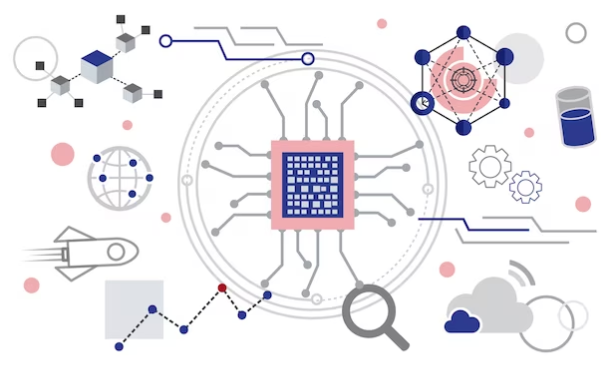Introduction:
In the realm of computing, a revolutionary wave is on the horizon—the rise of quantum computing. As traditional computers reach their limits in tackling complex problems, quantum computing emerges as a game-changer, promising unprecedented computational power. In this extensive exploration, we delve into the ascent of quantum computing, understanding its principles, potential applications, current challenges, and the transformative impact it could have on our digital landscape.
Understanding Quantum Computing:
1. From Bits to Qubits:
Bits, which stand for either a 0 or a 1, are used in conventional computers. On the other hand, qubits—which are made possible by the concepts of quantum superposition—are the foundation of quantum computing.
2. Entanglement and Quantum Superposition:
Qubits can become entangled, which means that regardless of their physical separation, the states of two qubits are inextricably linked. Quantum computers can execute massive computations in parallel thanks to entanglement and superposition.
3. Quantum Gates and Quantum Circuits:
Quantum gates manipulate qubits, performing operations like classical logic gates but with the added complexity of superposition. Quantum circuits are the building blocks of quantum algorithms, allowing for the execution of intricate computations.
The Quantum Advantage:

1. Exponential Computational Speed:
There is a possibility that quantum computers can handle some problems tenfold quicker than traditional computers. With quantum computing, it may be possible to perform tasks that are currently unfeasible, such as calculating enormous numbers or simulating intricate chemical structures.
2. Optimizing Optimization Problems:
Quantum computing excels in optimization problems, from logistics and supply chain management to financial portfolio optimization. Exploring multiple solutions simultaneously allows for more efficient and effective problem-solving.
3. Parallel Universe of Possibilities:
The concept of quantum parallelism allows quantum computers to consider numerous possibilities simultaneously, unlocking a realm of computational power that was previously unimaginable.
Potential Applications:

1. Cryptography and Security:
Quantum computers pose a unique challenge to traditional cryptographic methods. However, they also offer the potential for quantum-safe cryptography, ensuring secure communication in the era of quantum computing.
2. Drug Discovery and Material Science:
Quantum computers can simulate molecular and atomic interactions with unparalleled precision. This capability could revolutionize drug discovery, material science, and the development of new technologies.
3. Machine Learning and Artificial Intelligence:
Quantum computing has the potential to enhance Machine learning algorithms, enabling more efficient processing of vast datasets and solving complex optimization problems inherent in AI applications.
4. Complex System Simulation:
Quantum computers can simulate intricate physical systems, from climate models to the behavior of subatomic particles. This simulation capability opens new avenues for scientific discovery and understanding.
Current Challenges:

1. Decoherence and Error Correction:
Quantum systems are susceptible to environmental interference, leading to errors in calculations. Overcoming decoherence and developing robust error-correction mechanisms are critical challenges in realizing the full potential of quantum computing.
2. Scaling Quantum Bits:
Building large-scale, reliable quantum computers requires overcoming technical hurdles in scaling the number of qubits. Researchers are exploring various technologies, from superconducting circuits to trapped ions, to address this scalability challenge.
3. Quantum Software Development:
The field of quantum software development is in its infancy. Developing algorithms that effectively harness quantum computers’ power requires innovative thinking and collaboration between physicists, mathematicians, and computer scientists.
Quantum Supremacy:

1. Milestone Achievements:
Quantum supremacy, the point at which a quantum computer can perform a task beyond the capabilities of the most powerful classical computers, has been demonstrated in some instances. This milestone marks a significant step in the development of quantum computing.
2. Google’s Quantum Supremacy Claim:
In 2019, Google claimed to achieve quantum supremacy with its 53-qubit quantum computer, Sycamore. This announcement sparked increased interest and accelerated research efforts in the quantum computing field.
3. Beyond Classical Computation:
Quantum supremacy isn’t about rendering classical computers obsolete but showcasing that quantum computers can tackle specific problems more efficiently. It’s a testament to the unique capabilities of quantum computation.
The Road Ahead:

1. Collaboration and Research Initiatives:
Research into quantum computing is receiving significant funding from governments, IT firms, and academic organizations. Accelerating development and addressing upcoming scientific and engineering issues are the goals of collaborative efforts.
2. Hybrid Computing Models:
Hybrid models, combining the strengths of classical and quantum computing, are being explored. This approach leverages quantum computers for specific tasks while utilizing classical computers for more general computations and error correction.
3. Education and Workforce Development:
The rise of quantum computing necessitates the development of a skilled workforce. Educational programs and initiatives are emerging to train the next generation of quantum scientists, engineers, and developers.
4. Quantum Cloud Computing:
The concept of quantum cloud computing is gaining traction, where users can access quantum processors and algorithms remotely. This democratization of quantum computing resources could accelerate innovation across various industries.
Conclusion:
The rise of quantum computing represents a paradigm shift in our approach to computation. As we stand on the cusp of a new era, the potential applications of quantum computing are vast and transformative. Even while there are still obstacles to overcome, the combined efforts of scientists worldwide are advancing us toward a time when quantum computers will transcend digital bounds, providing hitherto unattainable processing power and launching a new wave of technological advancement.
In this journey toward the quantum frontier, the convergence of theoretical insights, experimental breakthroughs, and interdisciplinary collaboration will shape the trajectory of quantum computing. As the industry evolves, the true winners will be those who navigate the challenges with ingenuity, pushing the boundaries of what is possible in the quantum realm. The quantum future promises not only advancements in scientific understanding but also groundbreaking solutions to some of the most complex problems facing humanity.





